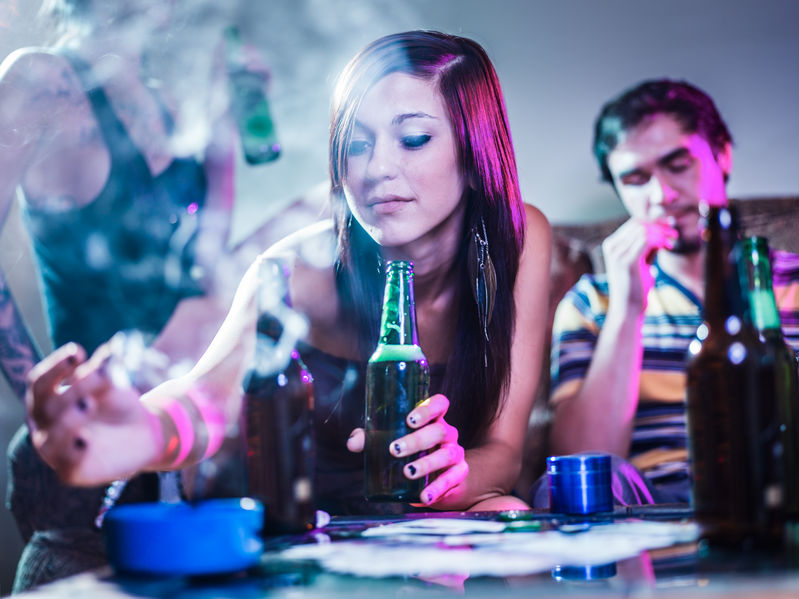Teen Recklessness Higher in America
April 13, 2017
America has high rates of teen recklessness, whether it be drug experimentation, unprotected sex or other impulsive behavior. Many blame teen recklessness on adolescents’ undeveloped brains, making them lack the impulse control and good decision skills that adults have. But is this the only explanation?
It’s all in our heads.
According to research performed over the past ten years by David K. Urion and Frances E. Jensen at Children’s Hospital at Boston and Harvard Medical School, only 80 percent of the brain is developed in adolescents.
Because the frontal lobe, which is responsible for reasoning, planning and judgment, is undeveloped in teens, adolescents are more prone to impulsive behavior and are easily influenced by their environment.
According to 2014 data from the National Institute on Drug Abuse, nearly 70 percent of high school seniors will have tried alcohol, 40 percent will have smoked a cigarette, and half will have experimented with an illegal drug.
Several Santa Fe High School students, all of whom asked to remain anonymous, shared their experiences here.
“There is always a lot of peer pressure in high school,” a junior claimed. “If someone’s friends are drinking or smoking, they join them. Even I have gotten drunk before and it was because my other friends were drinking too.”
“From my experience at Santa Fe High, I have seen a lot of drug experimentation in class with e-cigarettes, especially my math class,” a sophomore said. “I think it’s because there is this underlying peer pressure, and kids just want a stimulus. They’re bored and curious.”
A senior said, “Some people are just looking for a stimulus to excite their lives. By acting recklessly, teens show off and get their minds off of bad experiences and try to forget. Acting foolishly, recklessly, is used by teens just to escape the lives they are living.”
But should we blame all teen recklessness on the undeveloped adolescent brain?
It’s our culture.
Why is it that Chinese adolescents don’t engage in high rates of drug use?
Why have only 2 percent of Indonesian adolescents reported drinking when nearly one-half of Argentine teens have?
A study recently published by the “Journal of Developmental Science,” led by professor Laurence Steinberg, analyzed more than 5,000 individuals between the ages of 10 and 30 from 11 countries across Asia, Africa, Europe and the Americas.
Researchers found that even though all adolescents have risk-prone brains and are at their heightened sensation-seeking age, levels of actual teen recklessness vary across the world. These findings suggest that the context in which teens grow up has a significant impact on teen recklessness.
Dr. Steinberg told the “New York Times” that countries with low rates of teen recklessness “encourage self-control from a very early age and structure adolescence in a way that doesn’t give kids a lot of free, unstructured time to get into a lot of trouble.”
Steinberg’s study has shown that the United States has far higher rates of drug experimentation and teen recklessness in comparison to countries such as China and Indonesia.
It’s my freedom, my life.
In the United States, adolescence is viewed as an opportunity to achieve independence from one’s parents by pushing boundaries and taking chances. Many adolescents rebel in order to assert their independence from their parents or rules.
“If your parents, maybe even society, tell you not to do something, you automatically want to do it,” a freshman said.
Because individual independence is respected and cherished within America, and teenage years are seen as a time to gain independence, teens may be given too much freedom.
It’s on the screen.
In addition, media has a great influence on what teens think is OK to do and may be part of the reason there are such high rates of recklessness here and in Western Europe in comparison to other countries.
“I know that in America, you see drug experimentation on TV,” a senior commented. “Teens acting recklessly by partying and getting into fights is in movies and TV shows. People watch and listen to songs and movies about teen recklessness for their own enjoyment. I mean, maybe part of the reason why kids act the way they do is because they want the excitement they see on the screen.”
“I don’t think media is the only reason why teens do drugs and stuff, but I do think it influences it,” a junior said. “Teens see it on the screen, their friends do it — they want something to excite their lives or defy the rules.”
Perhaps the higher rates of drug experimentation and teen recklessness in the United States is because of American values regarding freedom, media influence, or the undeveloped adolescent brain. Or maybe it’s the combination of these factors that make American teenagers so prone to recklessness.


